Media
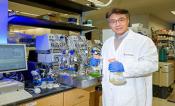
Study: Microalgae and bacteria team up to convert CO2 into useful products
Scientists have spent decades genetically modifying the bacterium Escherichia coli and other microbes to convert carbon dioxide into useful biological products. Most methods require additional carbon sources, however, adding to the cost. A new study overcomes this limitation by combining the photosynthetic finesse of a single-celled algae with the production capabilities of the bacteria E. coli.
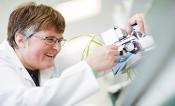
Lawson brings renowned plant science expertise to Illinois
Tracy Lawson's fascination with plants started as a child on a farm in England and recently brought the globally recognized expert in plant biology across the pond to Illinois! One of the university's newest faculty members talks about her research and what she's looking forward to most in this new feature!

RIPE 'hot potato' research appears in Scientific American
RIPE's Katherine Meacham-Hensold was interviewed for an article in Scientific American about her research looking at shortcutting the photorespiration process in potato.
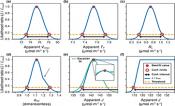
PhotoGEA: An R Package for Closer Fitting of Photosynthetic Gas Exchange Data With Non-Gaussian Confidence Interval Estimation
Edward B. Lochocki, Coralie E. Salesse-Smith, Justin M. McGrath
Plant, Cell and Environment10.1111/pce.15501
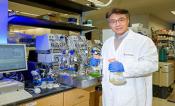
Bioconversion of CO2 into valuable bioproducts via synthetic modular co-culture of engineered Chlamydomonas reinhardtii and Escherichia coli
Nam Kyu Kang, Hyun Gi Koh, Yujung Choi, Hyunjun Min, Donald R. Ort, Yong-Su Jin
Metabolic Engineering10.1016/j.ymben.2025.03.004
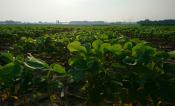
Variation in relaxation of non-photochemical quenchingbetween the founder genotypes of the soybean (Glycine max)nested association mapping population
Dhananjay Gotarkar, Anthony Digrado, Yu Wang, Lynn Doran, Ignacio Sparrow-Munoz, Sarah Chung, Nicholas Lisa, Farwah Wasiq, Gerardo Amaro, Bethany Blakely, Brian W. Diers, Daniel J. Eck and Steven J. Burgess
The Plant Journal10.1111/tpj.17219
